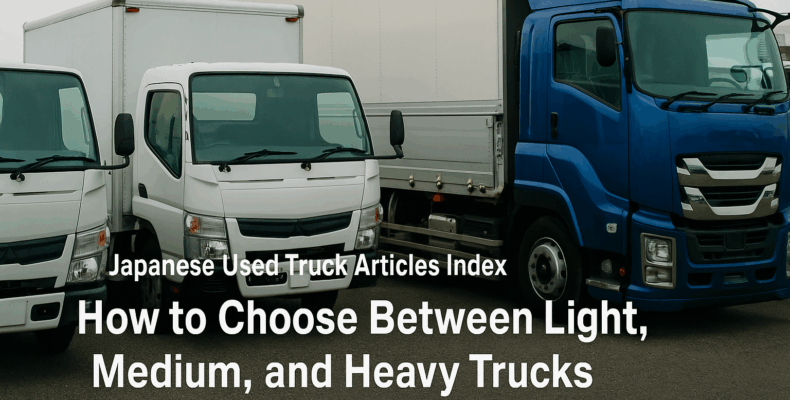How to Choose Between Light, Medium, and Heavy Trucks
Choosing the right truck size can be challenging—especially for first-time buyers. However, your decision has a huge impact on daily operations, fuel costs, and long-term maintenance. Whether you run a delivery business, manage a construction company, or operate a logistics fleet, selecting the right truck class ensures efficiency and profitability.
In this guide, we’ll compare light, medium, and heavy-duty trucks. We’ll also show you how to choose the right category based on your cargo, location, and business goals.
To make your search easier, here’s a list of
👉 Top 5 Trusted Japanese Used Truck Exporters for Global Buyers
Why Truck Size Matters
Before exploring specific types, let’s understand why truck class is so important. The wrong truck size may:
-
Increase fuel and maintenance costs
-
Cause unnecessary wear and tear
-
Limit the types of roads you can drive on
-
Lead to legal penalties if overloaded
Therefore, selecting the correct category is essential for cost control and safety.
1. Light-Duty Trucks (Up to 3.5 Tons)
Best for: Urban deliveries, small businesses, light cargo
Popular Models:
-
Toyota Dyna
-
Isuzu Elf (1.5–3 ton class)
-
Mazda Titan
Key Features:
-
Excellent fuel economy
-
Easy to drive in narrow streets
-
Lower maintenance costs
-
Great resale value in global markets
Use Case Example:
Bakery deliveries, furniture transport, mobile shops
Why Choose Light Trucks?
If your operations involve daily city runs with relatively low payloads, light trucks are the ideal choice. Their agility and fuel efficiency are unmatched.
2. Medium-Duty Trucks (3.5 to 8 Tons)
Best for: Inter-city transport, construction supply, heavier logistics
Popular Models:
-
Mitsubishi Fuso Canter (Medium class)
-
Hino Ranger
-
Nissan Diesel Condor
Key Features:
-
Balanced fuel use and payload capacity
-
Stronger suspension and frame
-
Suitable for a wide range of industries
-
Often equipped with hydraulic lift gates or dump beds
Use Case Example:
Construction site deliveries, farm produce transport, warehouse logistics
Why Choose Medium Trucks?
Medium trucks offer the best of both worlds. They carry heavier loads than light trucks but are easier to manage than heavy-duty ones. Moreover, they adapt well to both rural and urban roads.
3. Heavy-Duty Trucks (Over 8 Tons)
Best for: Long-distance freight, mining, industrial use
Popular Models:
-
Isuzu Giga
-
Hino Profia
-
Mitsubishi Fuso Super Great
Key Features:
-
Large engines with turbocharged power
-
Multiple axle configurations for high capacity
-
Designed for stability and long wear life
-
Excellent for container transport and oversized cargo
Use Case Example:
Cross-country shipping, heavy equipment hauling, export-level logistics
Why Choose Heavy Trucks?
If your operation includes massive cargo volumes or international logistics, heavy-duty trucks are built for endurance and strength. Though they consume more fuel, their load capacity justifies the cost.
Comparison Chart
| Feature | Light-Duty | Medium-Duty | Heavy-Duty |
|---|---|---|---|
| Payload Capacity | 500–3,500 kg | 3,500–8,000 kg | 8,000 kg and above |
| Fuel Efficiency | High | Moderate | Low |
| Ideal Environment | City roads | Mixed-use | Highways, off-road |
| Maintenance Cost | Low | Moderate | High |
| Recommended Users | Startups, retail | Construction, farms | Logistics companies |
Important Tips for Choosing the Right Class
-
Know your average payload
Don’t buy based on peak usage. Instead, choose a truck that suits your daily average load. -
Consider terrain and roads
Light trucks are perfect for city routes, while medium trucks handle mixed terrain better. Heavy trucks excel on highways or rugged sites. -
Think about your budget
Light trucks are affordable upfront and long-term. Medium trucks offer value for growing businesses. Heavy trucks require more investment but offer maximum output. -
Consult with trusted exporters
Japanese exporters can guide you to the best choice based on usage, fuel type, and local import laws.
👉 Top 5 Trusted Japanese Used Truck Exporters for Global Buyers
Why Choose Japanese Used Trucks?
-
Proven durability and engine performance
-
Easy access to spare parts worldwide
-
Variety of sizes and body types
-
Lower cost compared to European or American trucks
-
Export-ready with proper inspection reports
Japanese trucks offer reliability across all weight classes. Whether you’re buying one or a fleet, the value-for-money is unbeatable.
Final Thoughts: Choose Smart for Business Success
In conclusion, picking the right truck class is not just a technical decision—it’s a business strategy. With the right size, you’ll save fuel, reduce repairs, and keep your operations smooth.
No matter what your needs are, Japanese used trucks have the perfect solution. Start your journey with exporters you can trust.
👉 Top 5 Trusted Japanese Used Truck Exporters for Global Buyers
